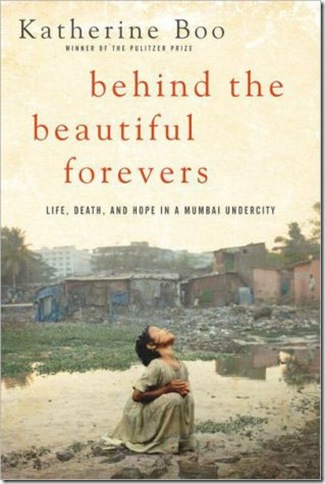Katherine Boo spent more than three years observing life in a wretched slum in Mumbai, one of India’s largest cities. She tells the story in this absorbing new book, filled with shocking details about wasted lives, gruesome deaths and widespread corruption.
Known as Annawadi, the slum was founded in 1991 by workers trucked in to repair a runway at the city’s international airport. When the work was completed, the workers decided to stay; they settled in snake-filled brush at the edge of the airport. Eventually, 3,000 squatters packed themselves into 335 flimsy Annawadi huts that bordered a sewage lake.
Only six residents held permanent jobs; many eked out a living by collecting recyclables. A teenager and his younger brothers kept a running wager about which scavenger would be the next to die. Out of despair some killed themselves by eating rat poison. Ironically, some residents stayed alive by eating rats.
One day an apparent hit-and-run victim with a mashed, bloody leg lay on a road separating the slum from the airport. He cried out, but no passerby offered to help, and after several hours he died on the pavement. Others perished in similar circumstances. Parents sometimes killed their sickly children “because of the ruinous cost of their care.” One is reminded of Charles Dickens or John Steinbeck when Boo describes the misery she witnessed.
Boo’s credentials are solid. She is a staff writer for The New Yorker magazine, and a former writer and editor at The Washington Post, where she won a Pulitzer Prize. She also is the recipient of a MacArthur Foundation “genius” award. It may surprise some to know that this is her first book.
The title was inspired by an advertisement for floor tiles on a concrete wall next to the airport emblazoned with words “Beautiful Forever, Beautiful Forever.”
Boo notes that one-third of the world’s poor people live in India, a nation like many others with extremes of wealth and poverty. A Mumbai billionaire resides in a 27-story house, where he employs 600 servants. And near the Annawadi slum, four luxury hotels jut into the sky.
The book hammers the theme of official corruption involving sanitation workers, teachers, judges, police, politicians, doctors and others.
 Teachers pay bribes to get good jobs. Surgeons ask for under-the-table money before they will operate. The outcomes of arrests and trials often hinge on payoffs to police officers and judges. When a slum dweller known as “one leg” sets herself on fire and then falsely accuses a next-door family of burning her, the case drags on for years after the woman dies of her burns. Accused family members know they must to pay bribes if they want to avoid prison sentences.
Teachers pay bribes to get good jobs. Surgeons ask for under-the-table money before they will operate. The outcomes of arrests and trials often hinge on payoffs to police officers and judges. When a slum dweller known as “one leg” sets herself on fire and then falsely accuses a next-door family of burning her, the case drags on for years after the woman dies of her burns. Accused family members know they must to pay bribes if they want to avoid prison sentences.
Policemen sometimes tell boys where they can steal building materials from warehouses and construction sites, as long as the cops receive a payoff after the stolen materials are sold.
When a slum dweller agrees to be part of a scheme to create fictitious kindergartens that will receive a government subsidy, she justifies her actions by asking, “How can anyone say I am doing the wrong when the big people did all the papers – when the big people say that it’s right.”
Plans are in the works to raze Annawadi and 30 other squatter settlements that ring the airport, and move some slum dwellers into apartments. The sewage lake has been filled in to make way for commercial development.
Readers may have difficulty keeping straight all the characters’ names. A glossary and index would have helped.
That said, Boo excels as a relentless inquisitor who personally witnessed most of what she reports in these pages. She also interviewed hundreds of people and pored through thousands of documents.
She offers no solutions. That would have gone beyond the scope of this book. Perhaps her account will encourage others in India and abroad to renew efforts to eradicate conditions that sound like fiction, but sadly are fact.
Bill Williams is a freelance writer in West Hartford, Conn., and a former editorial writer for The Hartford Courant. He is a member of the National Book Critics Circle and can be reached at billwaw@comcast.net.
Behind the Beautiful Forevers: Life, Death, and Hope in a Mumbai Undercity, by Katherine Boo; Random House, 256 pp.; $27
